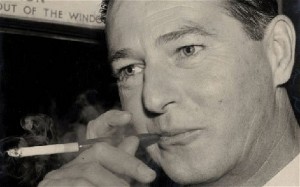BBC Radio 4 Extra is winding down its crash course on Terrence Rattigan. After airing radio renditions of some of his best-known plays, the online channel is airing a multi-part documentary about him. (Technically, it’s recitations from Michael Darlow’s biography Terrence Rattigan—The Man and His Work, but Clive Merrison’s lively reading style and amusing impersonations of Laurence Olivier and others makes it sound very documentarary.) A more concise doc aired a few weeks ago.
This is the Rattigan centenary, and it’s striking that it’s also the Tennessee Williams centenary, because where Williams was progressive and divided and helped foster Off Broadway and experimental workshops, Rattigan was fussily traditional, publicly calling out new writers like Beckett for not deigning to make their plays more middlebrow and popular. Rattigan died in 1977, so he lived not only to see the West End embrace the absurdists but the upholsterers such as Andrew Lloyd Webber.
Pity was, Terrence Rattigan fell out of fashion but he really wasn’t all that uncool. He’d done the screenplay for Graham Greene’s scruffy novel Brighton Rock, a movie that inspired lots of angry young men and punks. His play Deep Blue Sea was bracing in 1952 for its discussions of suicide, female empowerment, spousal abuse and homosexuality. The BBC bio ends with the popular reassessment of The Browning Version scaled down for scruffy small theaters.
Since my father was British, I always had an awareness of Rattigan as a prolific, popular playwright and not just (as most Americans think of him) the guy who wrote The Browning Version. My father used to let me stay up to see The VIPs when that 1963 aired on TV. Hardly considered one of his classics, but the cast that gathered to do it demonstrates what a Rattigan script was worth: Richard Burton& Elizabeth Taylor (right after Cleopatra), Louis Jourdan, Elsa Martinelli, Maggie Smith, Rod Taylor, Orson Welles, Michael Hordern, Stringer Davis, Clifton Jones, David Frost, Richard Briers… You wouldn’t see a cast like that until the disaster film craze of a decade later.
Rattigan’s output was remarkable, even for its theater-saturated time: 27 stage plays (which yielded at least a dozen films), six original screenplays, six screen adapations of works by others, half a dozen plays for TV and lots for radio.
The current consensus is that Rattigan was a fine playwright who sold himself short. Writing with a natural wit and a conversational prose style, he could have blazed new trails in dramatic storytelling but chose instead to simply excel at crowdpleasing melodrama.
The quality of his work isn’t usually questioned—I’d say his average plays are in the same range as what are considered Neil Simon’s best plays (The “BB” ones), with a similar mix of mirth and pathos. His best plays are real twisty turny emotional wrangles, with ripe subplots.
Ripe for revival, especially at East Coast regional theaters, I’d wager, where suburban audiences primed by Simon Gray, Lucinda Coxon and others will be psyched to find a mid-20th century writer of style, substance and tradition.

